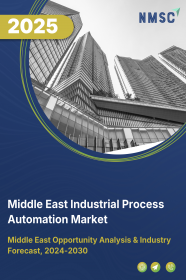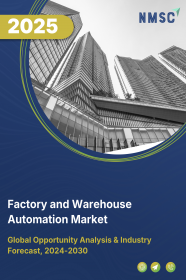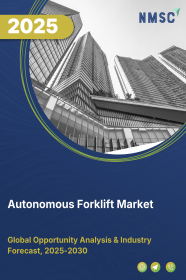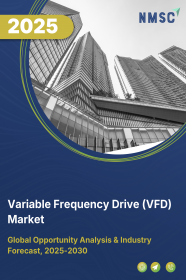
Middle East Industrial Process Automation Market by Component (MES [Hardware, Software, Services]; DCS [Hardware, Software, Services]; PLC [Hardware, Software, Services]; SCADA [Hardware, Software, Services]; Field Instruments; Industrial Robots; Human Machine Interface; Industrial PCs; Process Analyzers& Drives) and by End User (Oil & Gas, Chemicals & Refining, Energy & Power, Pulp & Paper, Metals & Mining, Pharma, & Others) – Global Opportunity Analysis and Industry Forecast, 2025–2030.
Industry: Semiconductor & Electronics | Publish Date: 08-Oct-2025 | No of Pages: 142 | No. of Tables: 134 | No. of Figures: 79 | Format: PDF | Report Code : SE1008
Industry Outlook
The Middle East Industrial Process Automation Market size was valued at USD 3.82 billion in 2024 and is projected to grow to USD 4.14 billion by 2025. Additionally, the industry is expected to continue its growth trajectory, reaching USD 5.51 billion by 2030, at a CAGR of 6.27% from 2025 to 2030.
The expansion of the oil and gas industry, along with the region’s strategic shift toward Industry 4.0, is driving strong growth in the industrial process automation market in the Middle East. Automation technologies such as SCADA systems, PLCs, and advanced analytics are widely deployed to optimize efficiency, safety, and reliability in oil and gas operations, while the integration of IoT, AI, robotics, and big data is transforming production systems across industries.
Despite these drivers, the lack of local technology providers poses a restraint, as reliance on international suppliers raises costs and complicates integration. At the same time, diversification strategies such as Saudi Arabia’s Vision 2030 and the UAE’s Operation 300bn are creating opportunities, with sectors including chemicals, pharmaceuticals, and food processing increasingly adopting automation to strengthen smart manufacturing and build globally competitive industrial bases
Expansion of Oil and Gas Industry Drives Market Growth in the Middle East
The rapid expansion of the oil and gas sector in the region, including Saudi Arabia and the United Arab Emirates (UAE), is a major driver of the Middle East industrial process automation market growth. Automation technologies such as Supervisory Control and Data Acquisition (SCADA) systems, Programmable Logic Controllers (PLCs), and process analysers are increasingly adopted to monitor, control, and optimize complex extraction, refining, and distribution operations. As the region focuses on maximizing efficiency, ensuring safety, and improving reliability in oil and gas production, the demand for advanced automation solutions continues to rise, accelerating growth.
Adoption of Industry 4.0 Strategy Boosts Demand for Automation
The region’s strategic shift towards Industry 4.0 significantly increases the Middle East industrial process automation market demand. By integrating technologies such as IoT, AI, robotics, and big data analytics into industrial operations, companies are transforming production systems to become more agile and data-driven.
According to the World Economic Forum, the UAE government aims to increase the contribution of the industrial sector to USD 82 billion by 2031 through Industry 4.0 adoption, positioning the country as a global hub for advanced industries. This initiative underscores the growing reliance on automation to enhance decision-making, streamline processes, and boost competitiveness across diverse sectors.
Limited Local Technology Providers Restrain Market Expansion
Despite strong drivers, the lack of local technology providers in the Middle East poses a challenge to widespread adoption of industrial process control systems. Heavy reliance on international suppliers results in higher costs, longer lead times, and difficulties in integrating automation solutions with existing infrastructure. These challenges slow down the deployment of automation technologies, particularly for industries seeking tailored and region-specific solutions.
Rising Focus on Smart Manufacturing and Diversification Initiatives
Significant opportunities are presented for the Middle East industrial process automation market trends as governments intensify efforts to diversify their economies beyond oil and gas. National strategies such as Saudi Arabia’s Vision 2030 and the UAE’s Operation 300bn highlight the role of smart manufacturing and automation in building competitive industrial bases.
Expanding sectors such as chemicals, pharmaceuticals, and food processing are increasingly adopting automation to enhance efficiency, ensure compliance, and support large-scale production. This diversification and focus on smart manufacturing create long-term growth opportunities for industrial process automation in the region.
Competitive Landscape
The promising players operating in the Middle East industrial process automation industry includeSiemens AG, Schneider Electric SE, ABB Ltd., Emerson Electric Co., Honeywell International Inc., Rockwell Automation Inc., Mitsubishi Electric Corp., Omron Corp., Yokogawa Electric Corp., Endress+Hauser Group Services AG, Delta Electronics, Inc., Fuji Electric Co., Ltd., Festo SE & Co. KG, SMC Corporation, and Parker Hannifin Corp, and Others.
Middle East Industrial Process Automation Market Key Segments
By Component
-
Manufacturing Execution Systems (MES)
-
Hardware
-
Software
-
Services
-
-
Distributed Control Systems (DCS)
-
Hardware
-
Software
-
Services
-
-
Programmable Logic Control (PLC)
-
Hardware
-
Software
-
Services
-
-
Supervisory Control and Data Acquisition (SCADA)
-
Hardware
-
Software
-
Services
-
-
Field Instruments
-
Industrial Robots
-
Human Machine Interface (HMI)
-
Industrial PCs
-
Process Analyzers and Drives
By End User
-
Oil and Gas
-
Chemicals and Refining
-
Energy and Power
-
Pulp and Paper
-
Metals and Mining
-
Pharma
-
Cement & Glass
-
Others
Key Players
-
Siemens AG
-
Schneider Electric SE
-
ABB Ltd.
-
Honeywell International Inc.
-
Mitsubishi Electric Corp.
-
Omron Corp.
-
Yokogawa Electric Corp.
-
Endress+Hauser Group Services AG
-
Delta Electronics, Inc.
-
Fuji Electric Co., Ltd.
-
Festo SE & Co. KG
-
SMC Corporation
-
Parker Hannifin Corp.
Report Scope and Segmentation:
|
Parameters |
Details |
|
Market Size Value in 2025 |
USD 4.14 billion |
|
Revenue Forecast in 2030 |
USD 5.51 billion |
|
Value Growth Rate |
CAGR of 6.27%from 2025 to 2030 |
|
Analysis Period |
2024–2030 |
|
Base Year Considered |
2024 |
|
Forecast Period |
2025–2030 |
|
Market Size Estimation |
Billion (USD) |
|
Growth Factors |
|
|
Companies Profiled |
15 |
|
Market Share |
Available for 10 companies |
|
Customization Scope |
Free customization (equivalent to up to 80 working hours of analysts) after purchase. Addition or alteration to country, regional, and segment scope. |
|
Pricing and Purchase Options |
Avail customized purchase options to meet your exact research needs. |

















 Speak to Our Analyst
Speak to Our Analyst
























